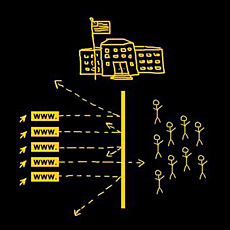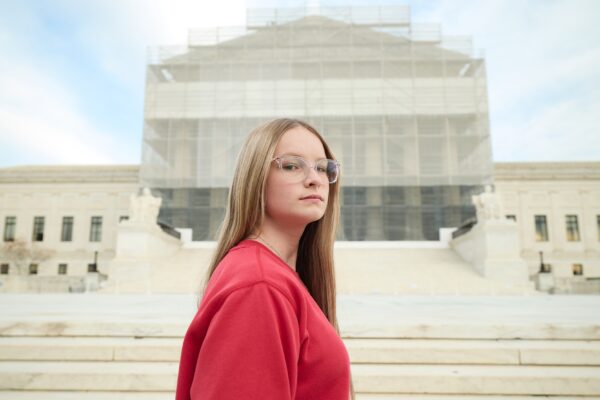ACLU "Don't Filter Me" Initiative Finds Schools In Four More States Unconstitutionally Censoring LGBT Websites
Schools In Four More States Unconstitutionally Censoring LGBT Websites

Additional Schools Put On Notice After Students And Teachers Report Illegal Censorship Of Educational Web Content
FOR IMMEDIATE RELEASE
CONTACT: (212) 549-2666; media@aclu.org
NEW YORK – The American Civil Liberties Union and its regional affiliates today sent letters to schools in Michigan, Texas, Pennsylvania and Virginia demanding they stop viewpoint-based censorship of web content geared toward the lesbian, gay, bisexual and transgender (LGBT) communities. Another school in New Jersey has voluntarily removed its anti-LGBT filter after receiving student complaints and an open records request from the ACLU. The letters were sent as part of the nationwide “Don’t Filter Me” campaign, in which the ACLU has teamed with Yale Law School to combat illegal censorship of pro-LGBT information on public school computer systems.
“There is no legitimate reason why any public school should be using an anti-LGBT filter,” said Joshua Block, staff attorney at the ACLU Lesbian Gay Bisexual & Transgender Project. “This is not a case where overbroad filters are accidentally filtering out LGBT websites. These filters are designed to discriminate and are programmed specifically to target LGBT-related content that would not otherwise be blocked as sexually explicit or inappropriate.”
The campaign asks students to check to see if web content geared toward LGBT communities – a frequent target of censorship in schools – is blocked by their schools’ web browsers, and then report instances of censorship to the ACLU LGBT Project.
Last month, the ACLU, the ACLU of Michigan and the ACLU of Kansas and Eastern Missouri sent demand letters to schools in Rochester, Michigan and Kansas City, Missouri after students there reported to the ACLU the web content at their schools was being censored. The North Kansas City School District immediately unblocked the websites identified by the ACLU, and the Rochester Community School District has undertaken a review of its filtering procedures. The ACLU continues to engage in communications with both school districts to ensure that their web filtering software is reconfigured to remove the unconstitutional anti-LGBT filters.
“I’m the vice president of the gay-straight alliance club at my school, but when I tried to go to GSANetwork.org to get ideas for club activities, I found it’s blocked for being ‘gay or lesbian or bisexual interest,’” said Brandon Bleau, an 18-year-old senior at John Glenn High School in Westland, Michigan, who submitted a complaint through the initiative. “None of the other clubs I know of at school have these kinds of roadblocks thrown in their way when they’re trying to plan meaningful things for their clubs to do.”
Since launching the “Don’t Filter Me” initiative, the ACLU has identified several web filter companies whose products include special categories designed to filter out LGBT websites. Some of these include:
• the Blue Coat software used by the Vineland School District in New Jersey and the Prince William County Schools in Virginia, which has a specialized filter called “LGBT;”
• the Websense software used by the Wayne-Westland school district in Michigan and the Goose Creek Consolidated Independent School District in Texas, which has a filter called “Gay or Lesbian or Bisexual Interests;” and
• the Lightspeed software used by the North Kansas City School District in Missouri and the Downingtown School District in PA, which includes LGBT sites in a filter called “education.lifestyles,” defined as “Education about lifestyles -- gay, lesbian, alternate.”
When used by a public school, programs that block all LGBT content violate First Amendment rights to free speech, as well as the Equal Access Act, which requires equal access to school resources for all extracurricular clubs. This means that gay-straight alliances and LGBT support groups must have the same access to national organizational websites that help them to function, just as other groups such as the Key Club and the chess club are able to access their national websites. By blocking access to LGBT websites, schools deny helpful information to gay-straight alliances and other support groups that could be vital for troubled LGBT youth who either don’t have access to the Internet at home or do not feel safe accessing such information on their home computers.
Several students reported to the ACLU that they had persuaded their schools to override the filters and grant access to websites on an individualized basis, but they felt it was burdensome and insulting to have to request special permission every time they sought to access a new website that had been blocked by the anti-LGBT filter.
“Unblocking individual sites is not a viable solution,” said Block. “As long as the anti-LGBT filter is in place, students will be confronted with a demeaning and stigmatizing message that the site has been blocked on account of its LGBT-related content. It’s unfair to put students in the difficult position of asking special permission before being allowed to access LGBT viewpoints. Public schools have a duty to provide students with viewpoint-neutral access to the Internet.”
A video showing students how to test whether or not their schools are illegally filtering content, and providing instructions for reporting censorship can be seen here: www.aclu.org/lgbt-rights/dont-filter-me
Students who want to report unconstitutional web filtering at their schools can fill out a form at: action.aclu.org/dontfilterme
More information on the ACLU’s work on LGBT school issues can be found here: www.aclu.org/safeschools
Related Documents


